- Home
- Peter Grainger
Songbird Page 34
Songbird Read online
Page 34
Waters said, ‘You chose to go for DCI. That’s high-ranking, well-paid and officially respected.’
‘Yes. And I also chose not to go any higher, that’s the first point. The second is, when Sheila became ill, it solved the dilemma for me. That’s not being heartless – she knew it herself and said as much to me. We laughed about it. The higher you rise, the more trapped you become – and you also become part of the problem. You think you’re going to spend your time as senior investigating officer on the big cases, but mostly you don’t. You spend half of it going to meetings about overtime budgets and equal opportunities strategies. And when you do get a good SIO position, you’ve always got an Allen on your back, nagging about politics and public perceptions.’
These were things Waters had understood when he was a member of Smith’s team but which he had never heard spoken aloud like this. Because, of course, it would then have been inappropriate and unprofessional.
Waters said, ‘DCI Freeman told me the present case is her third SIO.’
‘That’s unusual. She hasn’t been a DCI for long. She’s a bit of an odd one, though.’
‘In what way?’
Smith hesitated and didn’t answer directly.
‘Is my mate Detective Sergeant Christopher still following her around?’
‘No. At least, I haven’t seen him lately.’
Smith stared at the flowers again. The afternoon had moved on, and the angle of light was changing. Jo came to the stable door and said she was making tea if anyone wanted some. When she’d gone, Smith said, ‘Cara Freeman might have got rid of DS Christopher. You want to watch out. She’s ruthless and she could be looking for a replacement.’
‘Would that be a bad move?’
‘The answer to that sort of depends on what’s happened to Terry Christopher. But how’s it working out with Terek?’
Waters had to smile at that. Smith stretched back in the chair and laced his fingers behind his neck before he said, ‘Look. I chose to carry on as a detective sergeant for good reasons. You’ve got a small team you can shape to your way of doing things. You’ve got some responsibility and admin but not so much that you can’t get out of the building when you want to, and you get to talk to people face to face instead of sending someone else and reading reports about it. Being a sergeant is still hands on. It suited me but it might not be right for you, not as a longer-term option. You’ve got the qualifications and the ability to keep edging up every year or two, but it comes at a price operationally, that’s all I’m saying. Or you could quit and do something else.’
Waters knew before he looked up in surprise that the sharp blue eyes would be upon him as those words were spoken. What had he said that had given this game away?
‘Do you think I should?’
‘I can’t answer that. Nobody can but you.’
After a moment, Waters said, ‘Did I mention that I bumped into Katherine Diver recently?’
Smith sat up and looked around in alarm.
‘She asked about you. She said she hoped you were making a full recovery.’
‘You didn’t tell her where I live, did you?’
‘No. But she could probably find out if she wanted to. She’s been in touch again since then. Something about a business opportunity.’
Smith stood up again – it looked as if afternoon tea was to be taken in the sitting room of Drift’s End. Then he walked around the table and sat on the brick wall of the raised flowerbed. With one hand, he examined the nicotiana blooms that had attracted the hawkmoth.
‘Your dad would think that was hilarious, wouldn’t he? You going into business with the opposition?’ And then, after a short silence, ‘Look, it’s as I said, no one can make those decisions for you. I know this much, though. There are some unpleasant and dangerous people behind bars this afternoon thanks to you. You’ve made the world a slightly safer place, and so has any copper who’s doing the job properly. Not many occupations offer that as job satisfaction.’
Waters showed he was thinking about that, and then Smith went on, ‘And whatever you decide in the end, you’ve still got a case to sort out now. I’m guessing there’s someone else who at least looks interesting? If you want to share that, now’s the time. Jo knows we’ll be talking about your case but she’d rather not hear me doing it.’
Still without mentioning a name, Waters talked about the victim’s injuries, her phone records, the missing mobile, the fragments of leather beneath her fingernails, the traces of solvent on her skin, the pay-as-you-go number and the car which had been parked nearby when it was purchased, the car which was now in a Luton dealer’s showroom.
Smith was still examining the flowers – he had two or three of the little white trumpets between the open fingers of his right hand. He said, ‘And no one but you is taking any interest in him?’
‘Serena can see it.’
‘Freeman?’
‘I think she’s giving me enough rope to hang myself with, to be honest.’
Smith let go of the blooms and looked directly at Waters.
‘Well, to continue the imagery, they say you might as well be hung for a sheep as a lamb. You need to get face to face with this bloke. The brother-in-law, I think you said.’
‘No… I don’t think I told you that, DC.’
Just the merest ghost of a smile, then.
Chapter Thirty-Two
Waters arrived early in the office on the Monday morning, deliberately so. Mike Dunn had been the overnight CID presence, and he reported that there were no further developments in the Simms case. Why would there have been? No one was working it over the weekend, and they had a suspect ready to be charged.
If Freeman was going to be as good as her word, the plan was to get out of the office and start making some house calls in Luton by mid-morning. Waters wrote it down so no irate detective inspector could say later that they didn’t know what he was doing, where he was or how to reach him. Then he added Serena Butler’s name because she was the obvious choice, and probably the only detective constable in the building who would relish the thought of annoying Terek and Wilson simultaneously. And the fact she had already met some of the people he wanted to see would be a bonus.
Next, he created a new file on the central database and named it “GF”. Into it went what he already had, which was a few facts, some dates and times; a small tangle of circumstantial evidence that wouldn’t be enough to convict the man of a speeding offence as it stood. But the presence of the file on the database made a statement, which was his intention.
Detective Inspector Terek came into the office at 07.45, half an hour earlier than usual, and it was a fair guess Waters was the reason why. They exchanged nods across the office space but might as well have been sending coded radio signals across the solar system for all the communication that took place. Terek picked up papers from his office desk and left the room without saying a word.
Serena and Ford were due in at eight o’clock. There were still a few names missing from the list of holiday-makers, which Ford could follow up, and then he could report directly to Wilson, with little risk; the latest recruit was too new to be affected by the fall-out from all this. “It comes back on you,” Freeman had said, and Waters wanted to be sure that it did, and on no one else.
At ten minutes past eight, the three of them – Waters, Serena and Ford – were standing around his desk. Terek still hadn’t made a reappearance. Waters took the decision to go up to the Simms incident room with the intention of finding someone senior to tell that he was leaving the building, and if he couldn’t find them then Wilson would do. By now he had felt the warmth of bridges burning on his back, and there was a sort of reckless reassurance in it. If this was not where his future lay, he could at least do this one last job properly, the way it should be done.
And then Terek was in the room, at his desk and reading the sheet of paper that Waters had placed there, his plan for the day. Serena understood all of this, naturally, and her gaze travelle
d from the inspector to her sergeant and waited there as the senior of them approached the other.
‘Does this really require two of you?’
Not the easiest of questions to answer. Even today, in the age of austerity and cuts to public services, CID detectives usually work in pairs. It isn’t merely a tradition – there are plenty of good operational reasons for it.
Waters got as far as ‘I-’ before he was interrupted.
‘Because we still have quite a workload here. There are several more interviews that need to be carried out concerning Oliver Salmon’s background. Those must be completed as a matter of urgency if we’re to be in a position to charge by the end of the week.’
Over Terek’s head, Waters could see DCI Freeman – she was standing in the doorway to the office and watching. He couldn’t be sure she could hear what was being said.
‘Sir. But Serena has already met some of the people I’m going to speak to, and-’
‘Is that why she’s going? To make introductions? I don’t think so. You can manage this on your own. You two, get details from me in ten minutes. You’ll be taking a statement from one of Oliver Salmon’s teachers.’
Freeman was making a move now, heading in their direction. Much to his own surprise, Waters found there was a smile on his face as he said to Terek, ‘A statement from Oliver Salmon’s teacher? Does that require two people, sir?’
When the senior investigating officer arrived, Terek said good morning to her and made a deferential movement, a half step aside. Freeman returned his greeting, gave her own to the rest of them and asked what this meeting was about. She was a small, slight figure wearing a short-sleeved white blouse and smart casual trousers; she looked about the same age as Ford, and it was plain that Terek was frightened of her.
The DI explained he was making the best use of his resources, deploying staff according to their skills and the needs of the operation. As an experienced officer, Detective Sergeant Waters should be able to-
‘You’re quite right, Simon. The interviews planned last week must take priority.’
She hadn’t caught Waters’ eye yet, and he remembered Smith’s warning. Ruthless. Was she about to humiliate him in front of his team? He had the bizarre thought that his pension wouldn’t amount to much more than one decent meal a week in Sandrine’s restaurant. She was backing Terek over the interviewing of schoolteachers? That would contribute plenty, wouldn’t it?
Freeman had taken out her mobile, one of the big new iPhones. She studied it, and then she looked up and said, ‘Just checking my day. Doesn’t look too bad… So, I’ll do it.’
Terek said, ‘Ma’am?’
‘I’ll accompany Chris when he goes to Luton.’
Terek’s mouth fell open a little. This was so far beyond the pale that he seemed to take it as a physical blow, a slap in the face. He glanced at the rest of them before he said, ‘Really, ma’am? I don’t think… As SIO? Surely you…’
Freeman was looking at her phone again.
‘Eighty-eight per cent in the battery, so we should be OK. You can call me if there are any developments. Chris, you’re driving. I think my MOT might have run out.’
The detective chief inspector wasted no time, and they were out of the building and on the road within fifteen minutes. She watched Kings Lake as they headed out to the bypass, and then her focus moved to her phone. She spent several minutes scrolling through messages and emails, reading some and deleting others – all this Waters could see out of the corner of his eye as he drove. Then she put the phone away and took an iPad from her black leather bag. She logged on and he realised it was satellite-enabled. Was it issued by the force? All the others relied on wi-fi signals.
She said almost nothing to him as he drove down the first stretch of the A10, drove positively, overtaking occasionally, the lessons he had received in police driving becoming second nature now. By the time they passed Upham, Freeman had completed whatever was required on the iPad. She closed it and put it away, and then sat for a while watching the road ahead. Except that she wasn’t – she was watching the way he drove. The situation was the reverse of the one he’d been aware of as he’d driven Terek up to Barnsley; Terek had noticed nothing about his companion and nothing about the changing landscape as they travelled north. Freeman was relaxed, leaning well back in the passenger seat, which she had adjusted when she first got into the car, but Waters had the growing sense she was drawing all sorts of conclusions about him.
When words finally came, they surprised him. She said, ‘Would you describe yourself as ambitious, Chris?’
‘Er, probably not, ma’am…’
Somehow that response had ended with an up-note, as if he had asked a question. He sensed her head turning to look at him directly. He had given, without a doubt, completely the wrong answer.
‘Only call me “ma’am” for as long as you need to, OK? Except when we’re meeting the public – then you have to say it lots.’
He had to take his eyes off the road for a moment to look at her. Apart from the gender thing, that could have been Smith three years ago.
He said, ‘When I say I’m not ambitious, I’m referring to rank, I suppose. I had a fit of it at the end of last year and ended up as sergeant but… I don’t see it a ladder I have to climb. I’d say my ambition is to be good at the job, I suppose.’
‘Well, you already are, so that’s sorted. What’s next?’
Her speech was curiously abrupt at times, as if she felt only the essence of things was worth saying, that everything else was a waste of her time. Her mobile buzzed and she glanced at it – something there was worth a frown before she put it away.
Waters said, ‘Be better?’
‘Be better. And then the best? Like the Army. You want to be the best detective that ever lived. Or the best that you can be. Sounds like an uplifting message in a teenager’s birthday card, if you don’t mind me saying so. It still sounds like that even if you do mind.’
He kept his eyes on the road, which was single carriageway but open and fast. He allowed the speed to drift up towards seventy, and wondered what she would say. He had no doubt she would notice.
‘I agree, if you put it that way, ma-’ then wincing as he corrected himself, ‘but as far as I’m concerned, it’s a job worth being good at, worth trying to be better at.’
‘A job. Not a career?’
He shrugged an answer to that, realising they were already seeing signs for Cambridge. It was uncanny how many conversations recently had ended up in the same place, with him contemplating the navel of his own working life – Janey, Katherine, Smith and now Freeman.
She studied one of the signs as it flew by, and said, ‘You could have gone down the A1M from Peterborough.’
‘Long delays near Huntingdon. Major roadworks.’
Her terse manner of speech seemed to be infectious.
She said, ‘Is anyone wondering what’s happened to Terry Christopher? Nobody’s asked me.’
And the reason for that, Waters thought to himself, is probably that nobody wants to know unless the answer is something unpleasant. But he confirmed the detective sergeant’s absence had indeed been noted.
Cara Freeman said, ‘Still a sergeant but he’s gone to head up the chief constable’s personal liaison team at county headquarters.’
Waters did his level best to look impressed but had the feeling she’d seen through him. She said after a moment that DS Terry Christopher was very ambitious, and if they weren’t careful they’d all end up working for him one day. After a few seconds, Waters had to look at her. She kept a straight face for a little longer and then began to laugh.
They had already passed the first signs for Luton on the A6 when Cara Freeman said, as if she’d spent all the intervening miles thinking about his earlier answers, ‘So, if it isn’t the prospect of a bigger office and a PA that lights your candle, what does? What makes it worthwhile for you?’
He talked about enjoying the intellectual challenge,
and being part of a team. She picked him up immediately on that.
‘You see yourself as a team player?’
An hour and a half ago she had stood and watched him face to face with an angry detective inspector, his line manager. Waters chose his words with care – ‘I enjoy being part of a well-run team.’
‘Fair enough. But intellectual challenge and having some nice chums don’t get you out of bed in the morning, do they? If they do, I’ll apologise, and we can talk about Match of the Day instead. What did you think about that third goal in the Manchester derby at the weekend?’
This was ruthlessness alright – conversational ruthlessness. She wasn’t rude, not even brusque, but you had to keep up or she was done with you, and probably bored by you.
He said, ‘I don’t know the first thing about football or sport in general. I was a good middle-distance runner when I was at school but I gave it up at the first opportunity. I preferred sitting in the library and reading.’
‘What did you read?’
‘History books. Sometimes novels. I liked Dickens, which was considered strange in a comprehensive school, even in the sixth form.’
Now she was interested again for some reason.
‘You enjoyed Dickens but you don’t seem to have great expectations… Back to the job. What’s the thing you most enjoy about it?’
The dealership that had bought Fletcher’s car was their first call, and it was on this side of Luton. The destination pin was already visible on the satnav screen, and Waters estimated they would arrive there in a matter of minutes, depending on the traffic. They ought to be discussing how to approach this – instead, he was undergoing some sort of analysis. But it was a good question, a pertinent one, all things considered, and he took his time in coming up with an answer.

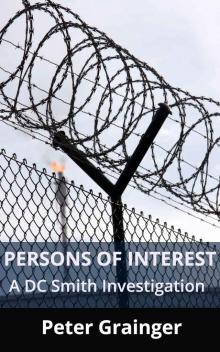 Persons of Interest
Persons of Interest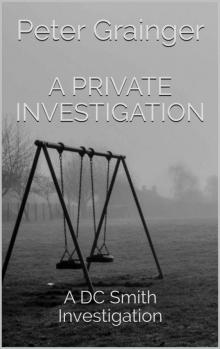 A Private Investigation
A Private Investigation Songbird
Songbird On Eden Street
On Eden Street An Accidental Death
An Accidental Death Time and Tide
Time and Tide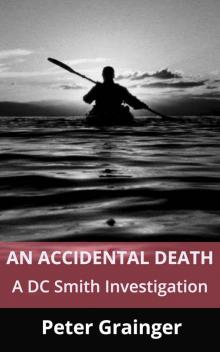 An Accidental Death: A DC Smith Investigation
An Accidental Death: A DC Smith Investigation In This Bright Future
In This Bright Future Lane: A Case For Willows And Lane
Lane: A Case For Willows And Lane The Rags of Time: A DC Smith Investigation
The Rags of Time: A DC Smith Investigation Luck and Judgement
Luck and Judgement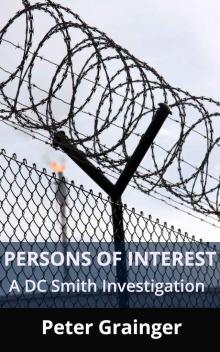 Persons of Interest: A DC Smith Investigation
Persons of Interest: A DC Smith Investigation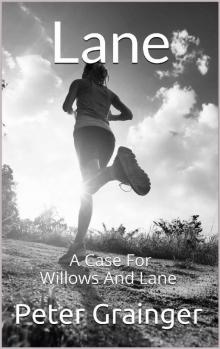 Lane
Lane But For The Grace
But For The Grace Time and Tide: A DC Smith Investigation
Time and Tide: A DC Smith Investigation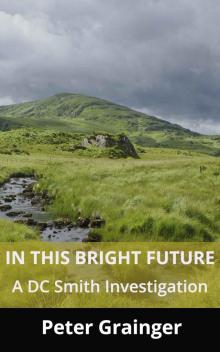 In This Bright Future: A DC Smith Investigation
In This Bright Future: A DC Smith Investigation The Rags of Time
The Rags of Time But For The Grace: A DC Smith Investigation
But For The Grace: A DC Smith Investigation Luck and Judgement: A DC Smith Investigation
Luck and Judgement: A DC Smith Investigation